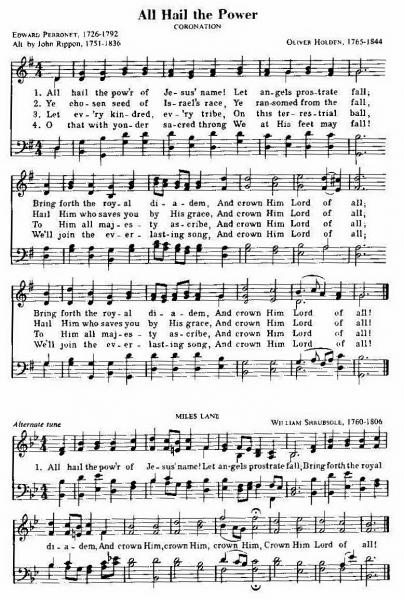Traditional Christian Hymns
"All Hail The Power"
ALL HAIL THE POWER
Author: Edward Perronet, 1726-1792. Altered by John Rippon, 1751-1836
"Coronation" Tune: Oliver Holden, 1765-1844
“Miles Lane" Tune: William Shrubsole, 1760-1806
Scripture Reference: Revelation 19:12, 16
"Thou art worthy, 0 Lord, to receive glory and honor and power: For Thou hast created all things, and for Thy pleasure they are and were created." Revelation 4:11
This hymn is often called the "National Anthem of Christendom." The hymn first appeared in the November, 1779, issue of the Gospel Magazine, edited by Augustus Toplady, author of "Rock of Ages" (No. 78). This text has been translated into almost every language where Christianity is known; and wherever it is sung, it communicates to the spiritual needs of human hearts. One writer has said, "So long as there are Christians on earth, it will continue to be sung; and after that, in heaven."
Edward Perronet was born at Sundridge, Kent, England, in 1726. He was a descendant of a distinguished French Huguenot family who had fled to Switzerland and later to England because of the religious persecution in France. Edward's father, a pastor in the State Church of England, was strongly sympathetic with the evangelical movement spearheaded by the Wesleys and George Whitefield. Edward, too, became a minister in the Anglican Church but was always critical of its ways. Once he wrote, "I was born and I am likely to die in the tottering communion of the Church of England, but I despise her nonsense." Soon, however, he broke from the Church and threw himself strenuously into the evangelistic endeavors of the Wesleys during the 1740's and 1750's. It was during this time that the Wesleys and their followers suffered much persecution and even violence from those who disagreed with their ministry. Concerning these experiences, Wesley made the following notation in his diary:
“From Rockdale we went to Bolton, and soon found that the Rockdale lions were lambs in comparison with those of Bolton. Edward Perronet was thrown down and rolled in mud and mire. Stones were hurled and windows broken.”
Another interesting account regarding the relationship between the Wesleys and Perronet concerns the incident when John Wesley announced to a congregation that Edward Perronet would preach at the next service. Being eighteen years younger than Wesley, Perronet had always refused to preach in the elder statesman's presence. Desiring to avoid a public conflict with Wesley, Perronet mounted the pulpit but quickly explained that he had never consented to preach. "However," he added, "I shall deliver the greatest sermon that has ever been preached on earth." He then read the Sermon on the Mount and sat down without comment.
Eventually, Perronet's strong-mindedness and free spirit caused a break with the Wesleys, especially on the issue of whether the evangelists as well as the regular ministers could administer the sacraments. Perronet continued to the end of his days as pastor of an independent church at Canterbury, England. His last words have also become classic:
“Glory to God in the height of His divinity! Glory to God in the depth of His humanity! Glory to God in His all-sufficiency! Into His hands I commend my spirit.”
Though Perronet wrote many other hymns and forms of poetry, most of which he published anonymously, this is his only work to survive. The success of this text has, no doubt, been furthered by three fine tunes. "Coronation," composed by Oliver Holden, a Massachusetts carpenter, self-taught musician and respected singing-school teacher, is most widely used in America. "Miles Lane" by William Shrubsole. Perronet's personal friend, is the most popular in Great Britain, while the festive "Diadem" tune, composed in 1838 for this text by James Ellor, an English layman, is frequently used as a choir number.
Many interesting accounts have been associated with the use of this hymn. One of the most remarkable is a story told by E. P. Scott, a pioneer missionary to India. One day he was waylaid by a murderous band of tribesmen who were closing in on him with spears. On impulse the missionary took his violin out of his luggage and began to play and sing this hymn. When he reached the stanza "let every kindred, every tribe," he saw to his surprise every spear lowered and many of these tribesmen moved to tears. Scott spent the remaining years of his life preaching and ministering God's love and redemption to these people. God in His providence used a simple hymn as a means of introducing the gospel to a group of needy pagans.

Taken from 101 Hymn Stories © Copyright 1982 by Kenneth W. Osbeck. Published by Kregel Publications, Grand Rapids, MI. Used by permission of the publisher. All rights reserved.
Return To Traditional Christian Hymns
Return to Praise and Worship Home Page
Enjoy this page? Please pay it forward. Here's how...
Would you prefer to share this page with others by linking to it?
- Click on the HTML link code below.
- Copy and paste it, adding a note of your own, into your blog, a Web page, forums, a blog comment,
your Facebook account, or anywhere that someone would find this page valuable.